The Need for a Mental Health Toolkit is Never More Needed Than Now
The Google Trends graph below shows the popularity of people searching for ‘mental health’ in the last decade. Consequently, this Mental Health Toolkit will help to satisfy this growing interest.
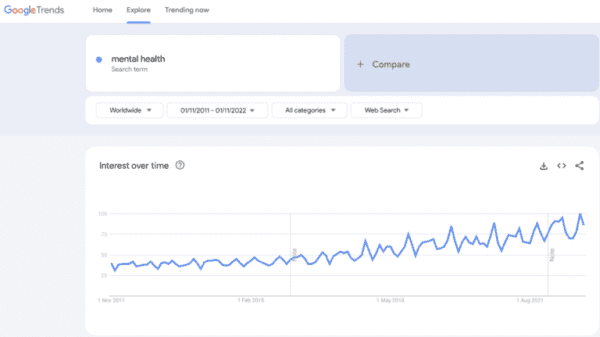
Know – What is Mental Health?
According to the World Health Organisation:
‘Mental health is a state of mental well-being that enables people to cope with the stresses of life, realise their abilities, learn well and work well, and contribute to their community. It is an integral component of health and well-being that underpins our individual and collective abilities to make decisions, build relationships and shape the world we live in. Mental health is a basic human right. And it is crucial to personal, community and socio-economic development.
Mental health is more than the absence of mental disorders. It exists on a complex continuum, which is experienced differently from one person to the next, with varying degrees of difficulty and distress and potentially very different social and clinical outcomes.
Mental health conditions include mental disorders and psychosocial disabilities as well as other mental states associated with significant distress, impairment in functioning, or risk of self-harm. People with mental health conditions are more likely to experience lower levels of mental well-being, but this is not always or necessarily the case.’
How We Talk About Mental Health is Changing and Needs to Change Even More
Often we use the term ‘mental health’ incorrectly. In fact, when asked about how we are, we are nowadays more easily able to say ‘It’s my mental health’. Meaning that we are struggling mentally. Not physically. Yet, when talking about our physical health we never reply with ‘It’s my physical health’ and that’s because we are educated better about our physical health hence we say things like ‘My stomach hurts’ or ‘It’s my old leg playing me up with gout’.
Essentially, our education is just beginning with mental health. Luckily, this Mental Health Toolkit will help to speed that up. The term Mental Health is relatively new in our 300,000 years on the planet. Even more so, the term ‘mental health’ is becoming something we can say to each other and know what it is, within the last decade.
Our Language Needs to Evolve From:
- Stage 1: ‘It’s my mental health’.
- Stage 2: ‘My mental health is poor’.
- Stage 3: ‘I am very stressed’, ‘I am not sleeping’, ‘I am depressed’. Or describing 1 of the 10 mental health issues.
- Stage 4: ‘I am very stressed because…’ and it is the because that helps us to articulate better what is wrong and also enables the other person to better understand what is wrong. Plus, by these two things happening, the chances of improving your poor mental health state will increase significantly.
So let’s get to stage 4 quickly, describing our mental health better. And this Mental Health Toolkit will help.
#1. Use the Headspace App for Meditation
To start, the app describes itself as ‘Guided meditations, courses, and mindfulness exercises on subjects like stress, general anxiety, worry, building resilience, and more topics for any moment. Learn mindfulness and choose from hundreds of meditations led by world-class experts from all walks of life. From guided meditations to soothing breathwork, get personalised recommendations daily based on what you like and how you’re feeling.’
Also, it is #57 in the health and fitness Apple Store and has 941,000 ratings which average 4.8 stars out of 5 stars. Even more, the Google store shows over 10m downloads. So here’s where to access for Apple and for Google.
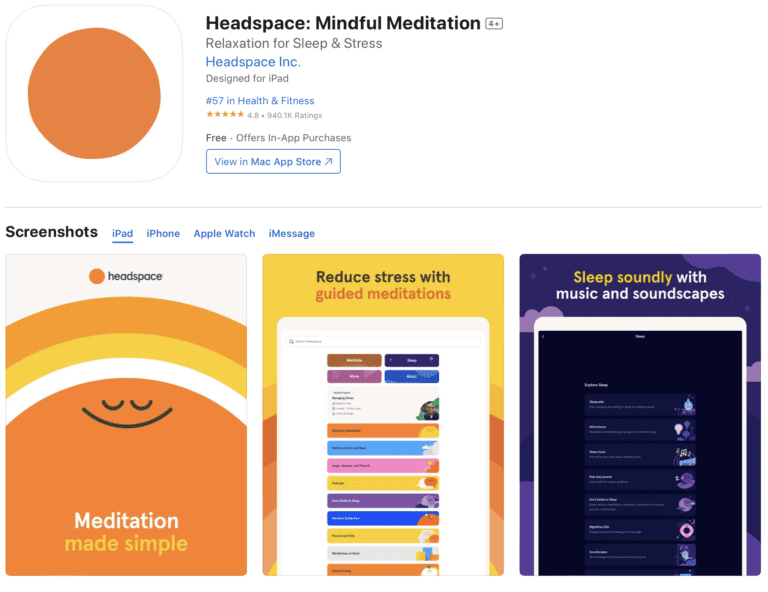
#2. Make the Most of Your Weekends – Plan Them
Now we live, on average, until we are 70 years of age. That’s 3,640 weekends. Now we start making the most of our weekends, from about 20 years of age and we can probably not do all that we want at the weekend from about 60 years of age. Maybe. So that leaves 2,080 weekends.
Then having children probably restricts the weekends from ages 30 to 45, leaving us about 25 years of doing almost as we wish at weekends. And that leaves us with 1,300 weekends. We probably have 3 weekends of the year where we are sick with a cold or a minor illness and 7 weekends a year where we have to do things we don’t want to but have to, like going to a distant cousin’s wedding or supporting a friend at an event we really don’t fancy doing or moving house. That leaves 1,050 weekends. So, in a lifetime we have about 1,000 weekends. 40% of which were before we had kids and 60% were after we had kids.
So plan your weekends. Grab a 52-week planner…
>> Weekend Planner <<
#3. For Anxiety and Depression Download the Sanvello App
Here’s another app in our Mental Health Toolkit. Their description is: ‘Best of all, your Sanvello journey is customisable to you. The app checks in with how you’re feeling so you can track your emotions and progress over time. As patterns are identified, Sanvello will provide customised tools, rooted in cognitive behavioural therapy, to keep you on the path to feeling better.’
Additionally, on Google Play this App is the Editor’s choice and has over 1m downloads with an average rating of 4.2 stars from 24,900 reviews.
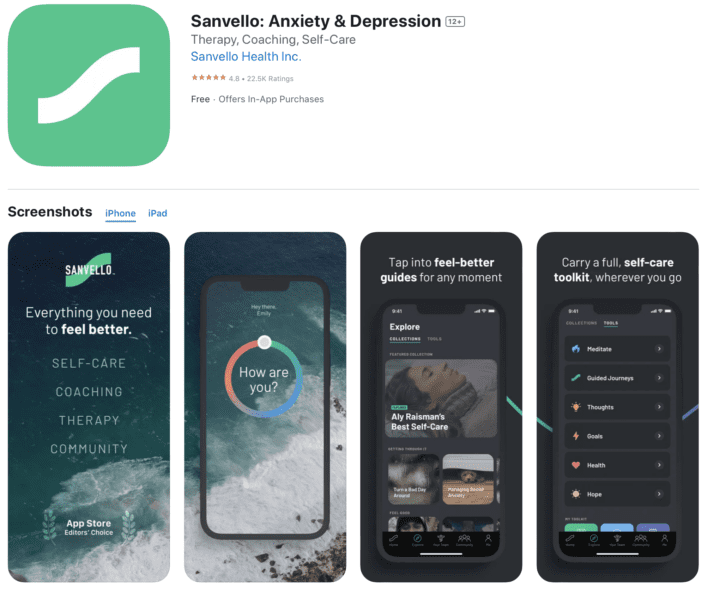
#4. Mentalhealth.org Suggests ‘Keep Moving’
Our bodies and minds are connected, so looking after ourselves physically also helps us prevent problems with our mental health (it works the other way around, too).
Moving our bodies – with sports, gardening, dancing, cycling, walking the dog, cleaning or going to the gym, for example – are great ways to improve our mental and physical health.
Basically, exercise releases “feel good” hormones that reduce feelings of stress and anger. It also helps us feel better about our bodies and can improve our sleep too. If it involves other people, like being part of a team, a class or a group we see regularly, that can also boost our mental health.
Luckily, we don’t have to be professional athletes, or sporty, to get the benefits of being physically active. From walking to dancing and basketball to the gym, the best exercise is simply the one we enjoy.
#5. Worry Watch is Great for Journaling and Tracking Your Moods
Great for journaling, tracking your moods, finding coping techniques or positive affirmations.
This is available as an Apple app. Also, you can go to their website to check them out or watch their video below:
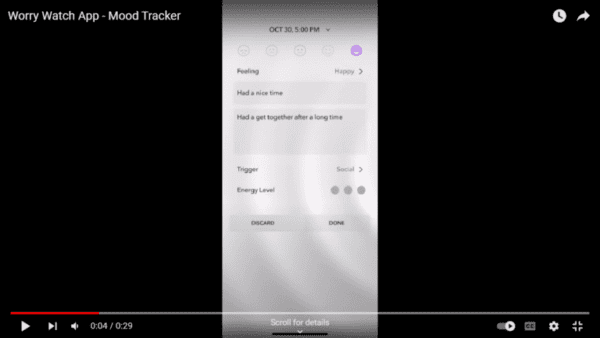
#6. Pocket-sized Tool To Help You Have a Mental Health Conversation at Work
Our next resource in the Mental Health Toolkit is as simple as you can get. Download our free pocket-sized information tool to help you on the go. Just click on the image below to print this A4 handy tool. Then, fold it into a playing card-size wallet handy reminder.
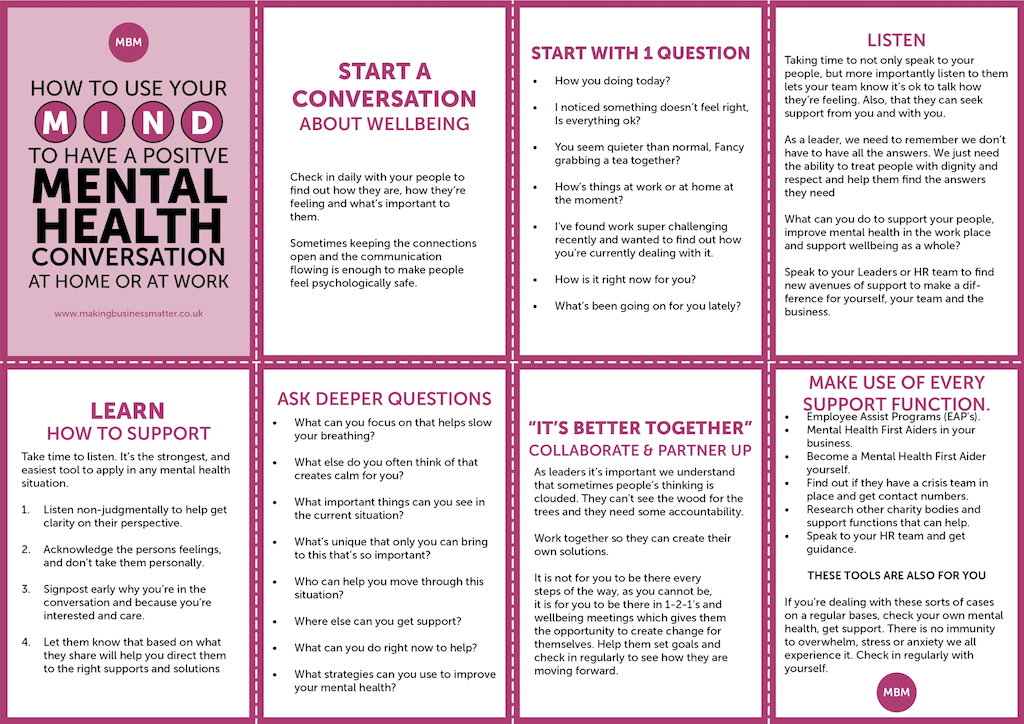
#7. Self Assessment May Help You to Identify The Problem
On the Good Thinking website, you can find 5 self-assessment questionnaires to help you identify better what’s going on. Also, they take about 20 minutes to complete. Try one of these self-assessment questionnaires:
- Overall, get to know more about you.
- Anxiety – Find out what you are worried about.
- Sleep – Discover why you might not be sleeping well.
- Depression – Why are you feeling down?
- Stress – Know what is stressing you.
#8. ‘I Am Sober’ – Sobriety Tracker for Recovery App
So this App describes itself as:
‘I Am Sober’ is more than just a free sobriety counter app. Along with tracking your sober days, it helps you build new habits and provides ongoing motivation by connecting you to a wide network of people all striving for the same goal: staying sober one day at a time. Through our growing sober community you can learn from others and contribute by sharing insights and tactics that have worked for you.’
Interestingly, the App has over 125k ratings at 4.9 and is #35 in the Lifestyle category.
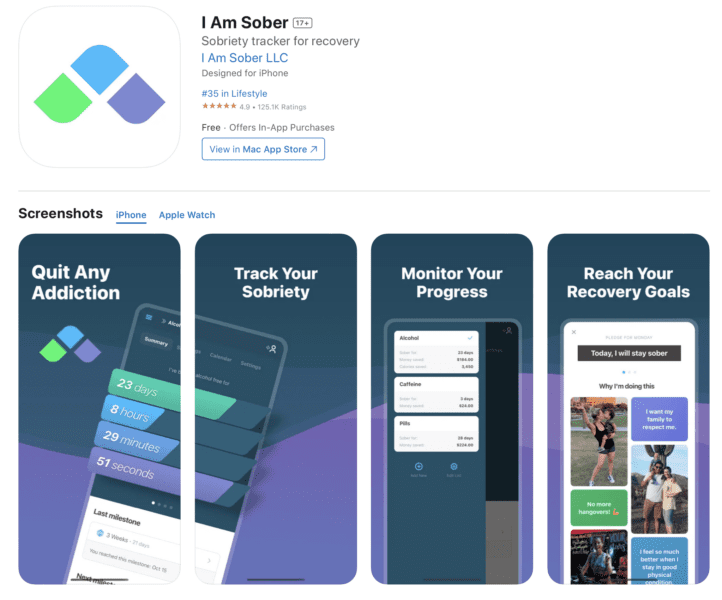
#9. Create a Mind Plan for Mental Health
Our next Mental Health Toolkit item is something to get you thinking. The NHS has created a set of simple questions with multiple choices. Basically, by choosing your answer to each of the 5 questions you then receive a ‘Mind Plan‘.
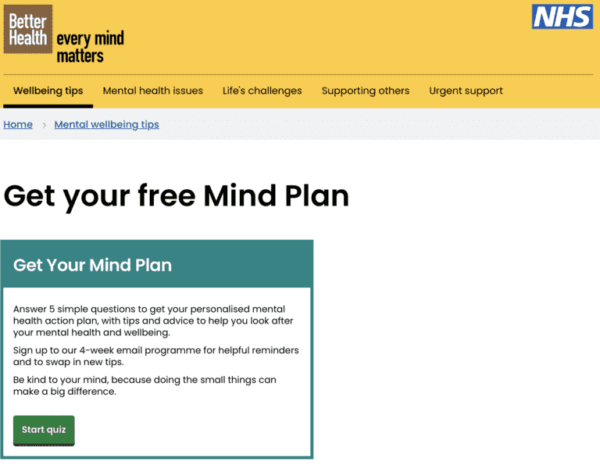
#10. Give Yourself a Hug
The Butterfly hug was first used with survivors of Hurricane Pauline in Mexico in 1998.
In essence, the butterfly hug technique is used to reduce stress, lower your anxiety, and calm you. Also, some people find that it grounds them, bringing them back to the present moment. As Eckart Tolle suggests in his book ‘The Power of Now’, living in the present. Not the past or the future, but the here and now.
Additionally, this Butterfly Hug method of therapy is a way to administer Dual Attention Stimulation (DAS). Furthermore, research has proven that bilateral stimulation can help induce calm, reduce stress, and enhance mindfulness.
Now watch this 1-minute video below to find out how to give yourself a well-deserved hug:

#11. Financial Stress is the Toughest of All the Stresses We Can Endure
Our next Mental Health Toolkit resource deals with stress. According to the Money and Mental Health Policy Institute, over 1.5 million people living in England today are experiencing both what they term “problem debt” and mental health issues.
Also, out of a similar survey of 5,500 English residents living with mental health problems – from Leeds to London – a striking 86% of them found that stress about money directly correlated to their worsening mental health.
Now read more in this article: How to Cope With Money Stress on Your Mental Health.
#12. Interview with Simon Blake, CEO of Mental Health England
In this interview with Simon Blake, CEO of Mental Health England, he shares his thoughts. So here’s the podcast to view the transcript and get the answers to the questions asked below.
- What is the definition of mental health?
- How has Covid-19 affected mental health?
- How accurately is mental health reported in the media?
- How does mental health affect physical health?
- How does mental health affect your life?
- Why is mental health important? – Why is mental health training important?
- Why is mental health on the rise?
- Please tell us about mental health month/week.
- When is mental health too much?
- What does mental health mean to you?
- Finally, where can someone get a mental health diagnosis?
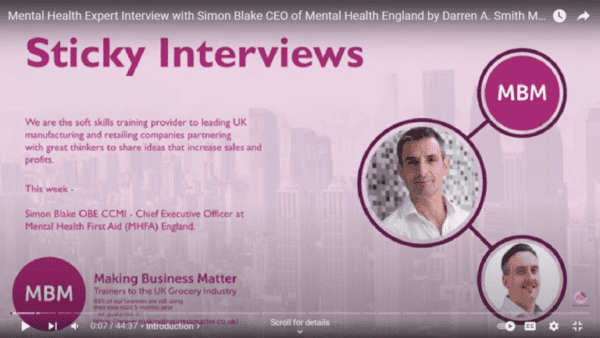
#13. Which Countries Talk About Mental Health the Most and the Least? It May Just Help to Know that You are Really NOT ALONE
The league table below shows by country, how often ‘mental health’ is searched outside of their most popular month since January 2020.
Notably, USA ‘talks’ about mental health the most.
For example, outside of the USA’s most popular month for the search ‘mental health‘, which was the month of October, the index was 100/100. Specifically, this search term was entered into Google on average 72/100, for the other 20 months.
Interestingly, Indonesia ‘talks’ about mental health the least.
Find out more in this article: Which Countries Talk About Mental Health Most & Least?
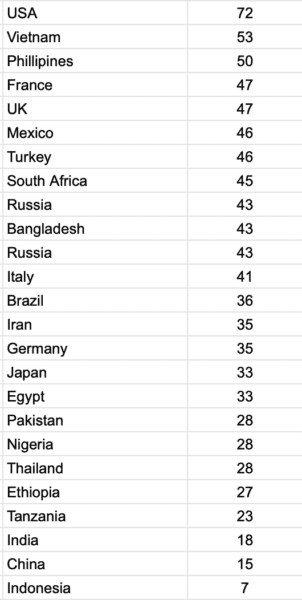
#14. Speaking of NOT ALONE – Knowing these Facts May Help
From the World Health Organisation:
- 1 in every 8 people in the world live with a mental disorder.
- Mental disorders involve significant disturbances in thinking, emotional regulation, or behaviour.
- There are many different types of mental disorders.
- Effective prevention and treatment options exist.
- Most people do not have access to effective care.
Recall that the first fact is ‘1 in every 8 people’. That is 868,000,000 or 868 million people. That’s twice as many people that live in the USA. Twice!
#15. Eight Mental Health Tips Video from Mind
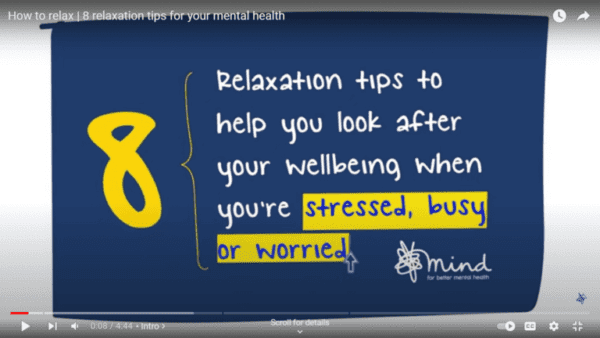
Yes, another vital video as part of our Mental Health Toolkit. From watching, you will discover 8 quick relaxation tips for managing stress and well-being:
- Take Breaks: Escape your daily routine with activities like reading or a bath.
- Deep Breathing: Practice deep breathing for calmness and well-being.
- Listen to Music: Enjoy your favourite tunes to relax.
- Visualise Peace: Imagine a peaceful place to ease your mind.
- Stay Active: Gentle exercise like yoga or walking helps with relaxation.
- Guided Relaxation: Use online resources or apps for guided meditation.
- Get Creative: Engage in artistic activities without stressing over results.
- Finally, Nature Time: Spend time outdoors to boost mental and physical well-being.
Now experiment with these methods to find what suits you best, and prioritise self-care.
#16. How to Have an Effective Mental Health Conversation
Here are other helpful videos as part of this Mental Health Toolkit. Watch them to understand the 4-part model of M.I.N.D and how it can help you have an effective mental health conversation at home or work:
- Mindset
- Importance
- Network
- Direction
In essence, each video contains tips to help you use your time working from home to become the very best version of yourself. And the first video is below:
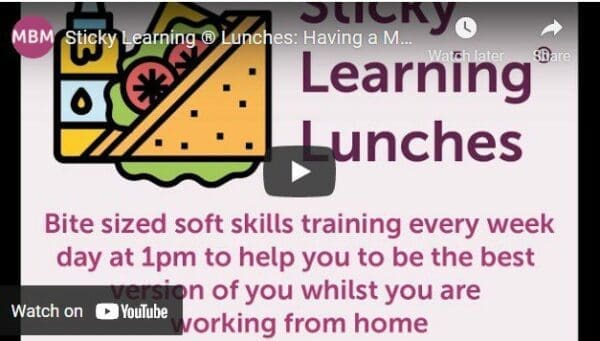
Then, go to this article to watch the other 3 videos: How to Have an Effective Mental Health Conversation.
#17. Overcoming Anxiety – A Self-help Guide Using Cognitive Behavioral Therapy by Helen Kennerley
This ever-popular guide offers a self-help programme, written by one of the UK’s leading authorities on anxiety and based on CBT, for those suffering from anxiety problems. In summary, a whole range of anxieties and fears are explained. From panic attacks and phobias to obsessive-compulsive disorder (OCD) and generalised anxiety. Not to mention, it includes an introduction to the nature of anxiety and stress and a complete self-help programme with monitoring sheets based on Cognitive Behavioural Therapy.
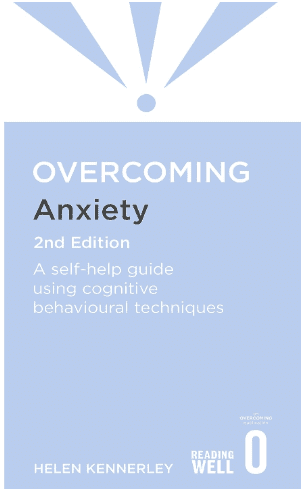
Now get a copy of the book on Amazon.
#18. Can You Make Someone Get Help with Their Mental Health?
Well, this 4-minute video from the charity ‘Mind’ will help you to answer that question:
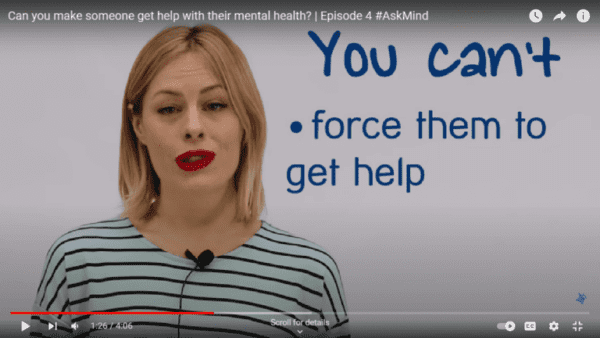
#19. Use the DARE App
Our next Mental Health Toolkit item is another useful app. So the DARE app is described as an evidence-based training program to help people overcome anxiety, panic attacks, worry, and insomnia. And you can track your progress daily with the mood journal. Based on the best-selling book ‘DARE’ that helps people overcome anxiety and panic attacks fast.
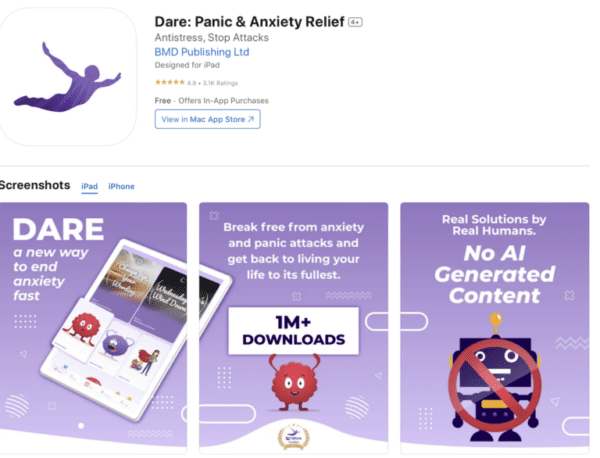
The App claims to:
- Ease Anxiety
- Eliminate Panic Attacks
- Reduce Worry and Stress
- Calm Your Mind
- Deepen Sleep
- Break Cycles of Negative Thinking
- Increase self-worth and confidence
- Unlimited audio downloads to your private personal area.
- And you get unlimited entries in your personal journal.
Also, the reviews are very good:

Plus, it has won a bunch of awards:

Finally, you can download it for Apple or for Google.
#20. Mental Health Coaching Cards
Ideal for self-coaching – asking you the questions you need to be asked to make improvements. Plus, they can be used by line managers as a coaching support tool. Simply open the deck and ask the questions.
These coaching cards are playing card size and each card contains a question. Overall, they’re split into 4 stages of; Mindset, Importance, Network and Direction, with each stage having 20 questions.
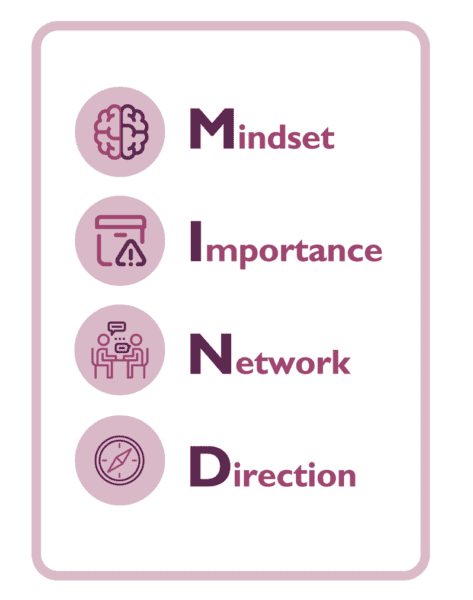
And it includes questions, such as:
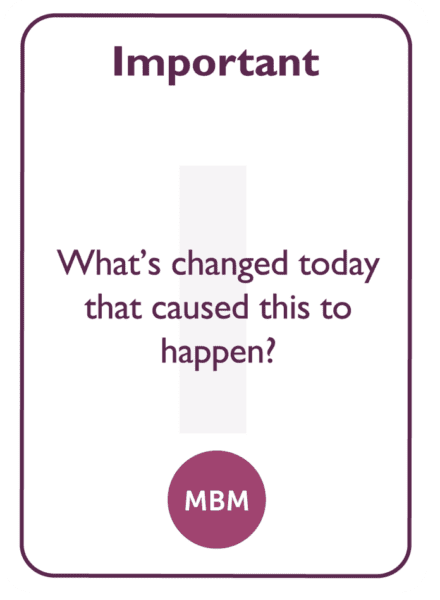
Use one-third of the mental health coaching card deck for free. Or buy on Amazon.
#21. Write a Letter to Yourself
Now here’s a unique tool for our Mental Health Toolkit. We have long known that getting ‘it down on paper works’. It’s just like writing a letter. The only difference is that we are writing to ourselves. Thankfully, this simple but nifty website enables us to write letters to ourselves that are emailed back to us later. You might write a letter telling yourself that you’re OK, you don’t need to worry and that the future is looking fabulous. So be your own positive coach.
Click the image below to send yourself a letter to arrive in 6 months or you can choose any date – maybe tomorrow.

#22. Know Your Hotspots
Whether your mental health has dropped because of a financial worry, an argument with a loved one, feeling lonely, or anything else. We all know that we have good days and bad days. Or good times and bad times. We also usually know when they are.
For example, Sunday nights are tough for me because it’s the start of a new week and it goes back to when I was a child for some reason. So I go to the cinema and have done it for years because it takes my mind off of it being Sunday night.
So by identifying our hotspots, we can begin to plan to reduce them, avoid them or get rid of them. Please identify your hotspots by:
Step 1:
- Looking back through your diary of last week – did you have a tough day? Why? Is it a trend?
- Looking back through your diary of last month – are there meetings you dread or people you don’t want to see?
- Looking back through your diary of the last 12 months – maybe a birthday triggered a low point or an event?
Step 2:
List at least 3 hotspots. They can be an event, a day of the week, or a person. Anything, as long as it is a trend.
Step 3:
For each hotspot find a way to:
- Reduce it. For example, if it is a financial worry and the letter through the post is the trigger, could someone else open your post for you?
- Avoid it. For example, if it is a person, can you arrange to meet them less or virtually or someone else to meet them instead?
- Delete it. For example, if it is loneliness at the weekend what can you plan so that you feel less lonely?
#23. Staying on the Mountain Longer and Getting Out of the Valleys Quicker
Life is full of ups and downs. Here at MBM, we call these mountains and valleys. It’s based on the excellent book ‘Peaks and Valleys’. The premise is that when we are on the mountain we need to stay there longer and when we are in the valley we need to get out of there quicker. If we do, we spend a longer time happier and our mental health is much stronger.
Like any ‘condition’ we need a plan. So when I broke my foot many years ago I wrote a short plan of the medication I had to take each day and the exercises I needed to do. Not a very comprehensive plan. Actually, it was more of a reminder. But sometimes that is all you need – a go-to plan.
Let’s go one step further and use this template below to put some deep work thought into how we manage our mental health. After all, as L’Oreal says:
We’re worth it.
Using the Mountain and Valley Template
The template will help us manage the mountains and the valleys. Overall, it consists of three columns:
- The first column shows the In, Stay and Out.
- The second column is the Mountains.
- The third column is the Valleys.
Click the below image for a downloadable version:
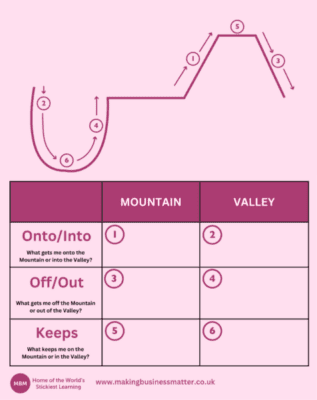
Instructions:
In essence, your task is to complete each box. For example, the first box is the In and Mountain box. This represents us getting onto the mountain. So, the question to answer for this box is ‘What gets you onto the mountain?’. Add 3 points. The next box, to the right, is the In and Valley box, asking ‘What gets you into the Valley?’. Again, list 3 things.
We then move on to the Out boxes – What gets us off the mountain and what gets us out of the valley? Obviously, what gets us off the mountain, by writing the 3 points, we then want to avoid these at all costs because we want to stay on the mountain. Whereas, for the valley, whatever gets us out, we should do it more.
Now complete all 6 boxes to create your Mental Health Management Plan.
#24. BetterSleep App
Here’s another app in this Mental Health toolkit.
Sleep better. Feel better. A personalised sleep experience for more restful nights and wakeful days.
Also, 81% of users have seen a positive impact on their stress and anxiety.
You can download it for Apple or for Google.
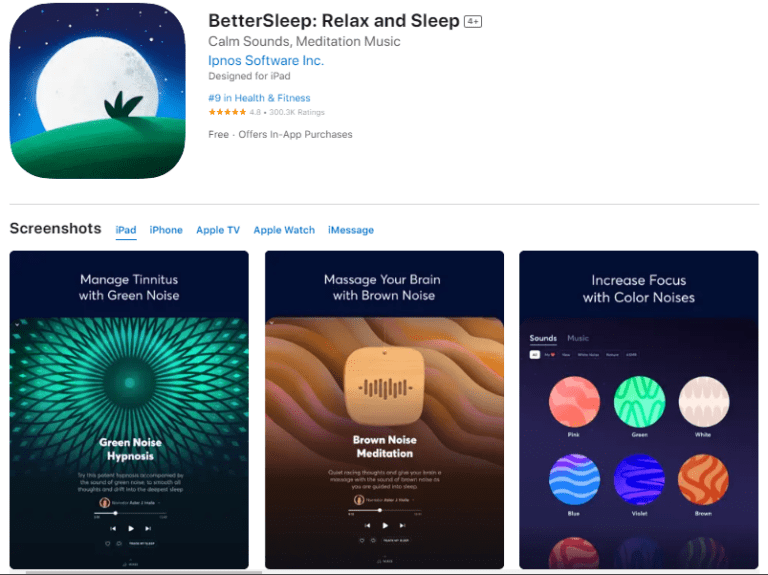
#25. Peaks and Valleys Book
Here’s a fabulous book by the same author of ‘Who Moved My Cheese?’ – Spencer Johnson. Now Good Books describes it as:
‘From the #1 New York Times bestselling author of Who Moved My Cheese? A brilliant new parable that shows readers how to stay calm and successful, even in the most challenging of environments.
A young man lives unhappily in a valley. One day he meets an old man who lives on a mountain peak. At first, the young man doesn’t realise that he is talking to one of the most peaceful and successful people in the world. But in the course of further encounters and conversations, the young man comes to understand that he can apply the old man’s remarkable principles and practical tools to his own life to change it for the better. Spencer Johnson knows how to tell a deceptively simple story that teaches deep lessons.’
Also, the reviews are 4 out of 5 stars for over 4,000 people. A must-read.
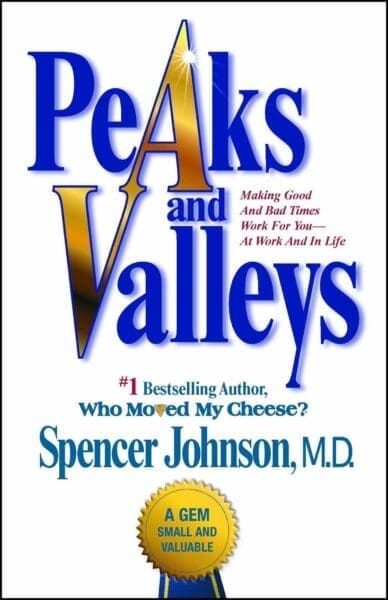
#26. Resilience Coaching Cards
Resilience Coaching Cards are for Coaches and also for those who say to themselves ‘I mustn’t take it personally’. Or ‘I must be a bit tougher’.
In essence, these coaching cards are playing card size and each card contains a question. The content of these resilience cards has been created by a registered psychotherapist. Also, the cards are split into 4 stages; M.I.N.D – Mindset, Importance, Network, and Direction.
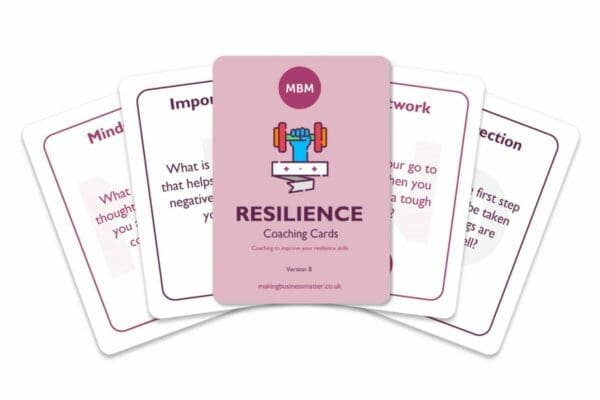
Now get a pack of resilience coaching cards or buy them on Amazon.
#27. Affirmation Statements and the Powerful Words We Hear
Affirmation statements can be very powerful. And they’re in the negative and the positive. Now here’s a story from my childhood:
‘Don’t run’. This was my Dad telling his 7-year-old son not to, as we unloaded the weekly food shop from the car to the house. I was keen to help, as any little boy helping his Dad. I stood at the boot of the car keen to take the next thing into the house. Dad handed me a 1-litre glass jar of orange juice (I think I may have single-handedly been responsible for the move to cartons!). Roll forward 20 seconds and there I am, sprawled out on the concrete path crying, blood everywhere. I had ran. My Dad spent the majority of the 6 hours we waited at A&E telling me that he had specifically told me not to run. So, why did I? The answer is in the meaning we give to the words we hear.
In this article by The Washington Post, they caution us about affirming in any old way. They cite studies about it mattering how we affirm ourselves. In essence, our emotions are very powerful and authenticity is the watchword because, in essence, we know when we are lying to ourselves. For example, ‘I am so great I’ll be rich tomorrow’ just won’t cut it because we don’t believe in ourselves. Whereas, ‘I love being a parent and I am good at it’, or ‘I am getting stronger everyday’, or ‘Yesterday was a good day and tomorrow will be too’.
Your Affirmations Must Follow the 5 Rules of PAPPE:
- Positive – The affirmation cannot be ‘I could be better’ because it is too negative.
- Authentic – You must believe what you say.
- Present – The brain needs to hear the affirmative as present, so it cannot be ‘One day I will be…’. Instead, ‘Use today’, as long as it is authentic.
- Powerful – We have a gift to tell ourselves something each day. So make it worthwhile.
- Emotive – The affirmation must be rooted in how you feel.
Mohammed Ali didn’t say, ‘In a few years I’ll be a good fighter’. Instead, he said, ‘I am the greatest’. In essence, he believed it, so he was being authentic.

Now write your affirmation and place it somewhere that you will see every day. And probably somewhere that others will not see.
#28. See More of Your Friends
The famous Mayo Clinic says this about being with friends:
Friends prevent isolation and loneliness and give you a chance to offer needed companionship, too. Friends can also: Increase your sense of belonging and purpose. Boost your happiness and reduce your stress.
#29. Watch Ruby Wax Talk About Mental Health
Ruby Wax, a comedienne, talks honestly about her own mental health and makes fun of it, herself, and our approach to mental health. Furthermore, it’s only 8 minutes and well worth it.

#30. Impostor Syndrome Coaching Cards
Here’s another set of cards in this Mental Health toolkit. Now these Impostor Syndrome Cards are for everyone who wants to understand, manage and overcome Impostor Syndrome.
Get a pack of the impostor syndrome coaching cards or buy them on Amazon.
#31. Let’s Talk about Our Black Dog
In summary, this 4-minute video gives a wonderful way of talking about depression and a wonderful book too. The first paragraphs of this video are here to show you how worth watching it is:
I had a black dog. His name was depression Whenever the black dog made an appearance, I felt empty and life seemed to slow down. He could surprise me with a visit for no reason or occasion. The black dog made me look and feel older than my years.
When the rest of the world seemed to be enjoying life, I could only see it through the black dog Activities that usually brought me pleasure, suddenly ceased to. He liked to ruin my appetite. He chewed up my memory and ability to concentrate. Doing anything or going anywhere with the black dog required superhuman strength.
At social situations, he would sniff out what confidence I had and chase it away. My biggest fear was being found out. I worried that people would judge me. Because of the shame and stigma of the black dog, I was constantly worried that I would be found out.
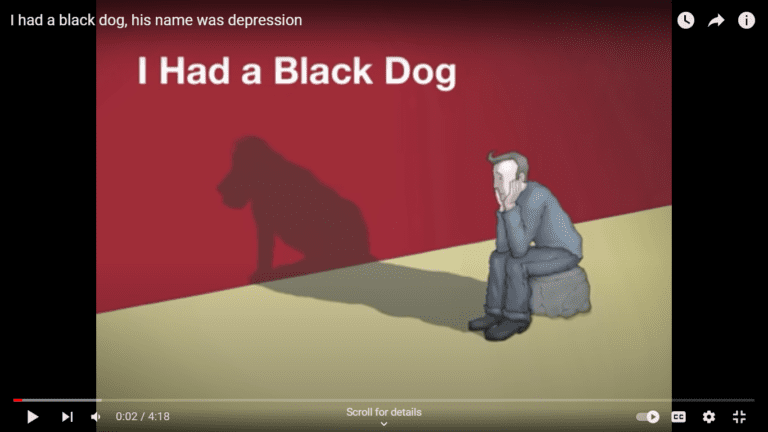
Also, the book version is below if you’re interested:
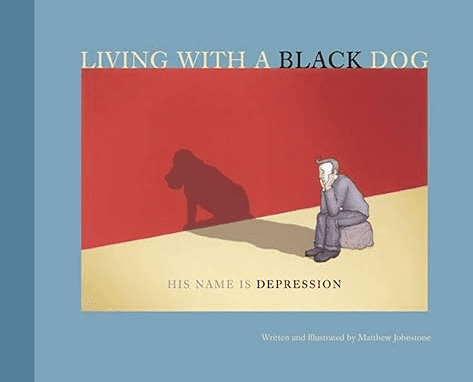
#32. Losing a Loved One
Now for a more personal note in this Mental Health toolkit. Losing a loved one is very tough. Very. I wrote about the loss of My Dad in this article and that while absolutely devastating there is a small light that I hang onto.
Recently, my Dad passed away. It’s heartbreaking and horrific in every way. The most common reflection from grieving people is that this traumatic event makes you realise what’s important in life. Specifically, life lessons such as to love more, argue less, and appreciate life. Take each day as it comes. While taking time to stop and smell the flowers, as the metaphor goes.
I am no different and completely concur. Our sentiments are supported by the men on death row. Asked, by one study, for their last words when they were in the gas chamber, they spoke not of anger, bitterness & hate, but of love, kindness & a wish for their loved ones to be happy.
The build I would like to offer is that of an unexpected help that Dad ‘going upstairs’ has brought. In so doing, he has passed down many life lessons.
Now read the rest of the article: Life Lessons From the Death of a Loved One – What Does Death Teach Us About Life?
#33. Symptoms of Depression
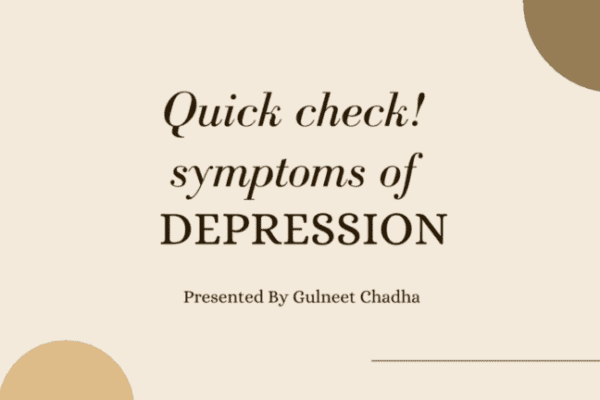
Identify at least 5 of the 9 symptoms displayed in the slide. View the slides for the full list. If the symptoms persist for five or more weeks, seek professional help.
#34. Mental Health Support is Available
A – The SANE helpline
Offers emotional support and information for anyone affected by mental health problems, and can help those with depression.
- Call 0300 304 7000 free
- Or email sanemail@org.uk
B – The British Red Cross Support Line
For help after a crisis or emergency including emotional and mental health support.
- Call the support line: 0808 196 3651
C – Anxiety UK
A charity providing support for people with anxiety.
- Call 08444 775 774 (Mon-Fri, 9.30 am-5.30 pm)
D – CALM (Campaign Against Living Miserably)
For people with all sorts of mental health issues.
- Call the helpline 0800-5858-58
E- Mental Health Foundation
Info and support for those with mental health problems or learning disabilities.
- Call 116 123
- Or email ku.gro.snatiramas@oj
F – Depression UK
Offers support to those affected by depression through providing self-help and support groups. Visit the Depression UK website for more information.
- Email: info@depressionuk.org
G- Mind
0300-123-3393 (Open 9 am-6 pm weekdays)
F- Samaritans
116 123 (Always open)
H- Campaign Against Living Miserably
0800-58-58-58 (Open 5 pm-midnight)
I- C.A.L.L.
0800-132-737 (Always open)
J- THE MIX
0808-808-4994 (Open 4 pm-11 pm weekdays)
#35. Three Types of Talk – Which One is the Most Powerful?
- You to you.
- You to others.
- Others to you.
Which One is the Most Powerful?
The first one – You to you.
All in all, it matters what we say to ourselves. Now would you say to a friend how you talk to yourself? No. In essence, we need to be kinder to ourselves.
So begin by being aware of how you talk to yourself. Specifically, how often you tell yourself that you are not good enough, didn’t try hard enough, you were useless, and so on. So treat yourself as you would a best friend, your Mum, or a loved one.
Finally, be kind to yourself because it matters what you say to yourself.
Well, was this Mental Health Toolkit helpful? Please share it and help others. Plus, please let us know what else you would like to see here.




